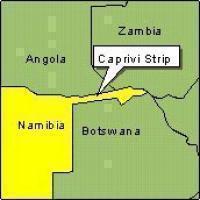







|
News and Information
State wraps up evidence in first chapter of second treason trial
| September 28, 2005 |

*WERNER MENGES
THE prosecution rested its case in the first stage of the second Caprivi high treason trial yesterday, having called seven witnesses to testify about the way that 11 of the 12 accused were arrested by the Namibian Police after the Botswana authorities handed them over.
The Inspector General of the Namibian Police, Lieutenant General Sebastian Ndeitunga, and the former commander of the Police in the Caprivi Region, Chief Inspector Hieronymus Goraseb, were two of the last witnesses to testify on behalf of the prosecution yesterday.
Deputy Prosecutor General Danie Small then closed the State's case on the special plea that 11 of the men on trial before Acting Judge John Manyarara had raised when the trial started on Monday last week.
The 11 are using the manner in which they were brought from Botswana, where they had been given refugee status after they left Namibia, and the way in which they were arrested and charged with high treason in Namibia, as a basis to challenge the High Court's jurisdiction over them.
They are claiming that their arrests by the Botswana authorities were unlawful, that they were abducted from Botswana when they were returned to Namibia in three separate groups between September 2002 and December 2003, and that their subsequent arrest and detention in Namibia were a breach of international law, wrongful and unlawful.
Under the circumstances, they were not properly and lawfully arrested or arraigned before a court that has the jurisdiction to try them on the charges they are facing, they claim.
Faced with these special pleas from 11 of the 12 men charged in the second trial over an alleged plot to force the secession of the Caprivi Region from the rest of Namibia, the State has had to present evidence to the court to prove that the suspects are lawfully before court.
It is that exercise that Small wrapped up yesterday.
All seven witnesses he had called told the court about their involvement in arrangements to receive Namibian citizens who were being deported from Botswana on three occasions in 2002 and 2003.
According to the version of events that they placed before the court, Namibian officials played an essentially passive role in these events.
They were merely ready to receive people who were being booted out of Botswana after the Botswana authorities decided that they no longer enjoyed refugee status there, they told the court.
Ndeitunga was the Namibian Police's Deputy Inspector-General for administration, and was also acting as Inspector-General, when the last of these handovers of supposed deportees took place on December 12 2003.
On that occasion, officials from Botswana handed seven of the 12 high treason suspects now on trial in the High Court to Namibian officials.
Ndeitunga told the court that the day before that, he had received a letter that Namibia's High Commission to Botswana, Theresia Samaria, had written to the Minister of Home Affairs to inform him that Botswana was planning to deport Namibians.
Botswana's Ministry of Foreign Affairs and International Co-operation had notified the Namibian High Commission in Botswana about the planned deportation.
According to that notice, the Namibians were to be deported for violating the conditions of their stay in Botswana, and specifically for having forfeited their refugee status by having returned to Namibia in the time that they were supposed to be seeking Botswana's protection.
Having received that letter from Samaria, he sent instructions to the then commander of the Police in the Caprivi Region, Goraseb, to arrange that the deportees should be received on the Namibian side of the border with Botswana, and that they should be screened carefully to check whether any of them were wanted in Namibia for any crimes, Ndeitunga related.
"I was not too sure what kind of people were going to be deported from Botswana," he said.
"I was just taking precautionary measures."
He himself never demanded the deportation of people from Botswana, Ndeitunga said in response to a question from Small.
When defence lawyer Nate Ndauendapo, who is representing 10 of the 11 men, asked Ndeitunga if he truly wanted the court to believe that their deportation had been a unilateral decision of the Botswana government, the Inspector-General answered: "That is the impression I got, because I didn't know where the decision was made."
Similar handovers of other Namibians deported from Botswana were made on September 20 2002, when two men who are now part of this group of treason suspects were handed over, and on December 6 2002, when another two treason suspects were handed to Namibian officials.
The next throw of the dice in the jurisdiction challenge that the eleven have launched will be up to defence lawyers Ndauendapo and Zagrys Grobler, who will have to indicate to the court today whether they will call witnesses in support of the challenge, and who those witnesses would be. |
Source: www.namibian.com.na |
| http://www.namibian.com.na/ |
|
| Support Caprivi Freedom |
Fill out the form below to become a member of this site and receive our regular newsletter.
|

|

